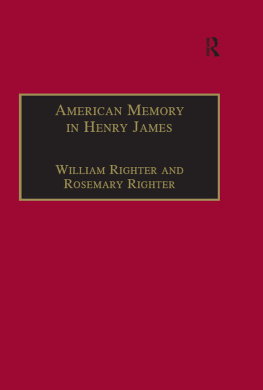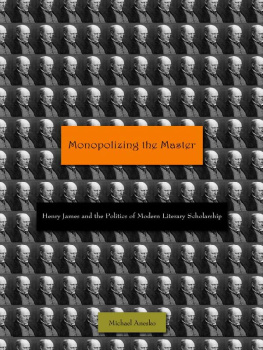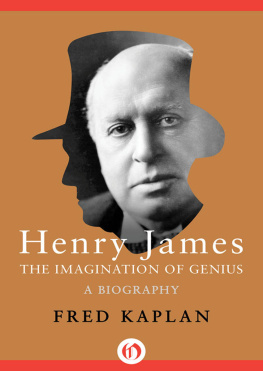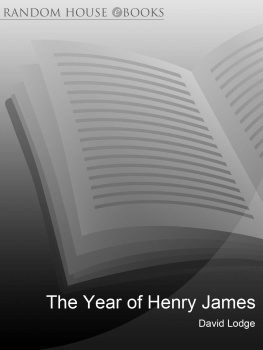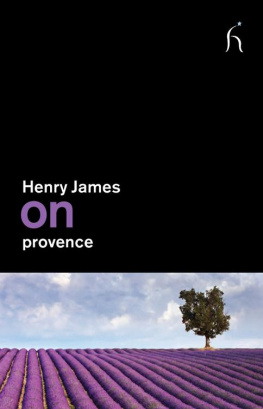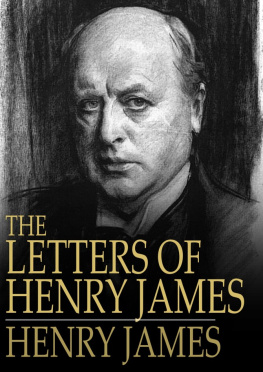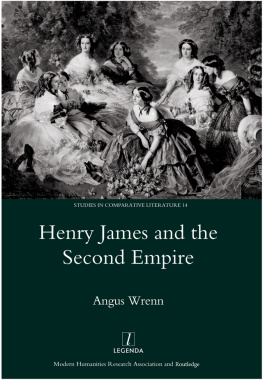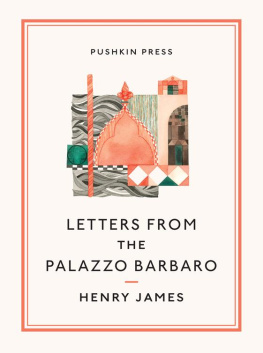James Henry - American memory in Henry James: void and value
Here you can read online James Henry - American memory in Henry James: void and value full text of the book (entire story) in english for free. Download pdf and epub, get meaning, cover and reviews about this ebook. City: United States, year: 2016, publisher: Routledge, genre: Religion. Description of the work, (preface) as well as reviews are available. Best literature library LitArk.com created for fans of good reading and offers a wide selection of genres:
Romance novel
Science fiction
Adventure
Detective
Science
History
Home and family
Prose
Art
Politics
Computer
Non-fiction
Religion
Business
Children
Humor
Choose a favorite category and find really read worthwhile books. Enjoy immersion in the world of imagination, feel the emotions of the characters or learn something new for yourself, make an fascinating discovery.
- Book:American memory in Henry James: void and value
- Author:
- Publisher:Routledge
- Genre:
- Year:2016
- City:United States
- Rating:4 / 5
- Favourites:Add to favourites
- Your mark:
- 80
- 1
- 2
- 3
- 4
- 5
American memory in Henry James: void and value: summary, description and annotation
We offer to read an annotation, description, summary or preface (depends on what the author of the book "American memory in Henry James: void and value" wrote himself). If you haven't found the necessary information about the book — write in the comments, we will try to find it.
American memory in Henry James: void and value — read online for free the complete book (whole text) full work
Below is the text of the book, divided by pages. System saving the place of the last page read, allows you to conveniently read the book "American memory in Henry James: void and value" online for free, without having to search again every time where you left off. Put a bookmark, and you can go to the page where you finished reading at any time.
Font size:
Interval:
Bookmark:

AMERICAN MEMORY IN HENRY JAMES VOID AND VALUE
American Memory in Henry James
Void and Value
WILLIAM RIGHTER
Edited by Rosemary Righter

First published 2004 by Ashgate Publishing
Published 2016 by Routledge
2 Park Square, Milton Park, Abingdon, Oxon OX14 4RN
711 Third Avenue, New York, NY 10017, USA
Routledge is an imprint of the Taylor & Francis Group, an informa business
Copyright William Righter 2004
Edited by Rosemary Righter
The editor has asserted her moral right under the Copyright, Designs and Patents Act, 1988, to be identified as the editor of this work.
All rights reserved. No part of this book may be reprinted or reproduced or utilised in any form or by any electronic, mechanical, or other means, now known or hereafter invented, including photocopying and recording, or in any information storage or retrieval system, without permission in writing from the publishers.
Notice:
Product or corporate names may be trademarks or registered trademarks, and are used only for identification and explanation without intent to infringe.
British Library Cataloguing in Publication Data
Righter, William
American memory in Henry James: Void and Value 1. James, Henry, 18431916 Criticism and interpretation 2. History in literature 3. America in literature I. Title II. Righter, Rosemary 813.4
Library of Congress Cataloging-in-Publication Data
Righter, William,
American memory in Henry James: Void and Value / William Righter; edited by Rosemary Righter
p. cm.
Includes bibliographical references.
ISBN 0-7546-3674-7 (alk. paper)
1. James, Henry, 18431916 Knowledge History. 2. James, Henry, 18431916 Knowledge History United States. 3. National characteristics, American, in literature. 4. Literature and history United States. 5. United States in literature. 6. History in literature. 7. Memory in literature. I. Righter, Rosemary. II. Title
PS2127.H5R54 2003
813.4-dc21
2003045332
ISBN 13: 978-0-7546-3674-8 (hbk)
Contents
In my own country I haunt museums. It is not that the great museums of the Old World contain objects of less importance or allure. But in the New their meaning is transformed. Their relation to the surrounding culture acquires an urgency which is linked to detachment. So in New York, Chicago or Washington the great museums have a character quite different from the Louvre or the Uffizi, for rather than representing a continuous tradition through the masterpieces which embody it those works are an alien presence. The museums bring the fragments, icons, the surplus value of other worlds to a new form of creation, a strange mixture of quickening and withdrawal which that assembly offers to a place that is not its own. They oppose rather than underwrite, confront rather than confirm. The moments passed in them are committed to an unspoken discontinuity. And for me the great galleries of America become the compelling point of reference and refuge, above all in my own birthplace, in Kansas City, where the Nelson Gallery, marvellous in its absurd eclecticism, rises like a marble island from the sprawl.
Such islands have their magic, but it is ambiguous. The enterprise of implanting the beautiful and the edifying may intend a cultural transformation. But ones overwhelming impression is of something apart and hence an implication of conflict, a conflict surely not envisaged by those who conceive the movement of civilization as an unbroken progression, a steady advance of something like Arnolds sweetness and light. If a version of this latter gleams for Lambert Strether on the banks of the Seine, it is the vision of its transplantation, of creating a new world of culture in the vast spaces beyond the Hudson which hovers in the background of The Golden Bowl, spaces in which cultures mission mingles with the darkness of exile. That mixture of darkness and light, seldom in a controlled chiaroscuro, but in hidden implications, disturbing vistas, moments of discovery and of loss even of terror fills those late works of Henry James that attempt, however unevenly, a final assessment of an America which does not reflect the world of his youth but alien forces reaching to an unknown future. One discovers Europe to know America said F.O. Matthiessen, in a replay of a saying of Emerson. But what America? One perhaps whose opacity grows for the sequence of discoverers whose most reflective representative is Lambert Strether. It will of course include James himself, for it is above all The American Scene which gives the restless analyst his own voice.
If the relation of culture to the new America escapes both artistic and intellectual resolution, it remains the focus of Jamess final years, where his creative powers had both their greatest triumphs and their breaking point.
William Righter
When cancer was diagnosed, my husband William Righter was in one of the most creative phases of his life. He had completed the first, manuscript, draft of this book and revised one section, . He was also working on two further books a further exploration of Jamess sense of history, and Culture and Entropy, which would have been his riposte to Matthew Arnold and an anatomy of what constitutes culture at the dawn of the twenty-first century. It may have been the rigours of therapy that caused him to cease work on the present text, but I think it was more that, knowing better than he would admit how fast the hands on his lifes clock were now whirring towards midnight, he was determined to use what time remained on the other volumes. Before he died, only nine months later, I promised him that I would bring this book to completion. I am keenly aware how much he would have polished, as he always did at the revising stage. My own editing has been of the lightest; the greatest challenge was in interpreting the elegant but always almost indecipherable flow of his thick-nibbed fountain pen across the pages.
I have had unstintingly generous help in this labour of love. I owe a particular debt to Martin Warner, my husbands close colleague and friend at the philosophy department of Warwick University, who has kept steady watch over the project, solved puzzles that had eluded me and given invaluable guidance on structure. In Cambridge, Robert Lord gave early typescript versions the most meticulous and learned reading, and sat down with me to work out a reordering of some chapters and sections. From Princeton, Michael Wood gave enthusiastic encouragement and advice. To them, as indeed also to my colleagues at The Times who helped to sustain me in the abyss of loss, I am supremely grateful. The result is perhaps inevitably a half-hewn representation of the workings of a mind that bridged the Atlantic as few have, and that was too subtly imprvisible for an attempt to smooth out any rough edges to be other than an intellectual impertinence. But the insights in this text are, I think and hope, sufficiently rewarding for the reader to accept and to excuse any unavoidable element of the provisional.
Rosemary Righter
1. The Jamesian Perspective
2. The Composite Light
3. America and the Pathos of Desire

Jamess concept of history was shaped by European culture; but the shaping took a number of stages. These move from the construction of Europe, to the recollection of America; then to the reconstruction of Europe in terms of America, and thus finally to the reconstruction of America, in terms of a Europe seen by way of America.
Font size:
Interval:
Bookmark:
Similar books «American memory in Henry James: void and value»
Look at similar books to American memory in Henry James: void and value. We have selected literature similar in name and meaning in the hope of providing readers with more options to find new, interesting, not yet read works.
Discussion, reviews of the book American memory in Henry James: void and value and just readers' own opinions. Leave your comments, write what you think about the work, its meaning or the main characters. Specify what exactly you liked and what you didn't like, and why you think so.

